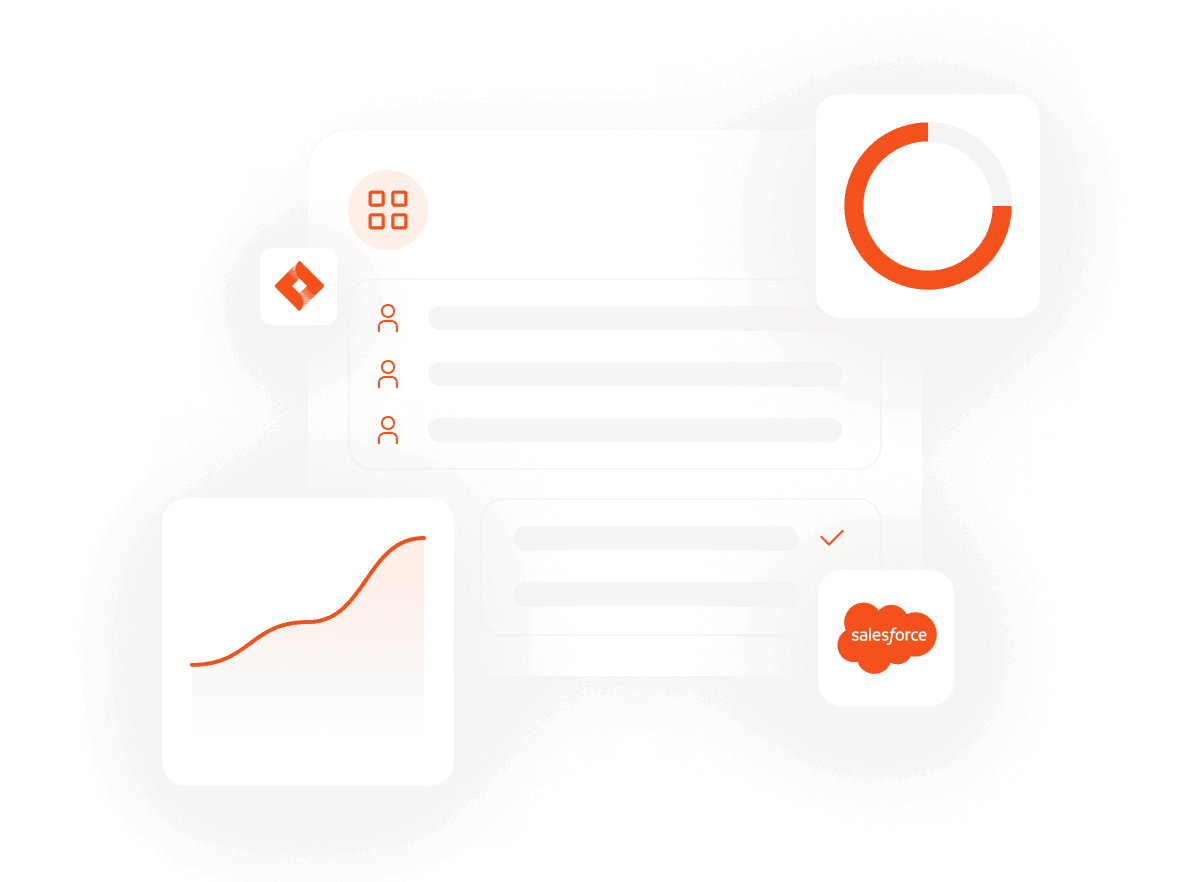July 28, 2024
Automating Customer Collateral with Success Software
Key takeaways
Automating customer-facing collateral is a strategic way to enhance efficiency and deliver consistent, high-quality customer interactions. Customer success software plays a significant role in streamlining the creation, management, and distribution of customer-facing materials. Here’s how customer success software can help you automate and optimize your customer communications.
1. Streamline Content Creation
Customer success software can automate the creation of personalized content for different customer segments, saving time and resources while maintaining a high level of customization.
Key Components:
Template Libraries: Use pre-designed templates for various types of collateral, such as emails, reports, and guides.
Dynamic Content Generation: Automatically generate content tailored to individual customer needs and preferences.
Content Management Systems: Centralize your content repository for easy access and updates.
2. Enhance Consistency and Branding
Automation helps maintain consistency in your customer communications, ensuring that all materials adhere to your brand guidelines and messaging.
Key Components:
Brand Guidelines Enforcement: Ensure all collateral aligns with your brand standards.
Automated Approval Workflows: Set up approval processes to review and approve content before distribution.
Centralized Asset Management: Store all branding assets in one place for easy access and consistent usage.
3. Personalize Customer Interactions
Customer success software enables you to personalize customer interactions by leveraging data and automation, creating a more engaging and relevant experience for each customer.
Key Components:
Customer Segmentation: Segment customers based on behavior, preferences, and needs.
Personalized Messaging: Automate personalized messages that address specific customer pain points and goals.
Triggered Communications: Set up automated triggers to send relevant content based on customer actions or milestones.
4. Automate Reporting and Insights
Generating reports and insights manually can be time-consuming. Customer success software can automate these processes, providing real-time data and actionable insights to improve decision-making.
Key Components:
Automated Reporting: Schedule and automate the generation of regular reports.
Real-Time Dashboards: Use dashboards to visualize key metrics and performance indicators.
Data Analysis Tools: Leverage tools to analyze customer data and extract valuable insights.
5. Improve Efficiency and Scalability
Automation enhances operational efficiency and scalability, allowing your team to focus on strategic activities that drive customer success and business growth.
Key Components:
Workflow Automation: Automate repetitive tasks and workflows to save time.
Scalable Solutions: Implement scalable solutions that grow with your business.
Resource Allocation: Free up resources to focus on high-impact activities and initiatives.
Conclusion
Automating customer-facing collateral with customer success software is a game-changer for enhancing efficiency, consistency, and personalization in customer communications. By streamlining content creation, maintaining brand consistency, personalizing interactions, automating reporting, and improving efficiency, you can deliver a superior customer experience. Implementing these strategies will not only boost customer satisfaction but also support long-term business growth.
Incorporating these key components into your automation strategy can create a robust framework that optimizes customer communications and drives success for your organization.
July 28, 2024
Automating Customer Collateral with Success Software
Automating Customer Collateral with Success Software
Automating Customer Collateral with Success Software




Automating customer-facing collateral is a strategic way to enhance efficiency and deliver consistent, high-quality customer interactions. Customer success software plays a significant role in streamlining the creation, management, and distribution of customer-facing materials. Here’s how customer success software can help you automate and optimize your customer communications.
1. Streamline Content Creation
Customer success software can automate the creation of personalized content for different customer segments, saving time and resources while maintaining a high level of customization.
Key Components:
Template Libraries: Use pre-designed templates for various types of collateral, such as emails, reports, and guides.
Dynamic Content Generation: Automatically generate content tailored to individual customer needs and preferences.
Content Management Systems: Centralize your content repository for easy access and updates.
2. Enhance Consistency and Branding
Automation helps maintain consistency in your customer communications, ensuring that all materials adhere to your brand guidelines and messaging.
Key Components:
Brand Guidelines Enforcement: Ensure all collateral aligns with your brand standards.
Automated Approval Workflows: Set up approval processes to review and approve content before distribution.
Centralized Asset Management: Store all branding assets in one place for easy access and consistent usage.
3. Personalize Customer Interactions
Customer success software enables you to personalize customer interactions by leveraging data and automation, creating a more engaging and relevant experience for each customer.
Key Components:
Customer Segmentation: Segment customers based on behavior, preferences, and needs.
Personalized Messaging: Automate personalized messages that address specific customer pain points and goals.
Triggered Communications: Set up automated triggers to send relevant content based on customer actions or milestones.
4. Automate Reporting and Insights
Generating reports and insights manually can be time-consuming. Customer success software can automate these processes, providing real-time data and actionable insights to improve decision-making.
Key Components:
Automated Reporting: Schedule and automate the generation of regular reports.
Real-Time Dashboards: Use dashboards to visualize key metrics and performance indicators.
Data Analysis Tools: Leverage tools to analyze customer data and extract valuable insights.
5. Improve Efficiency and Scalability
Automation enhances operational efficiency and scalability, allowing your team to focus on strategic activities that drive customer success and business growth.
Key Components:
Workflow Automation: Automate repetitive tasks and workflows to save time.
Scalable Solutions: Implement scalable solutions that grow with your business.
Resource Allocation: Free up resources to focus on high-impact activities and initiatives.
Conclusion
Automating customer-facing collateral with customer success software is a game-changer for enhancing efficiency, consistency, and personalization in customer communications. By streamlining content creation, maintaining brand consistency, personalizing interactions, automating reporting, and improving efficiency, you can deliver a superior customer experience. Implementing these strategies will not only boost customer satisfaction but also support long-term business growth.
Incorporating these key components into your automation strategy can create a robust framework that optimizes customer communications and drives success for your organization.
Automating customer-facing collateral is a strategic way to enhance efficiency and deliver consistent, high-quality customer interactions. Customer success software plays a significant role in streamlining the creation, management, and distribution of customer-facing materials. Here’s how customer success software can help you automate and optimize your customer communications.
1. Streamline Content Creation
Customer success software can automate the creation of personalized content for different customer segments, saving time and resources while maintaining a high level of customization.
Key Components:
Template Libraries: Use pre-designed templates for various types of collateral, such as emails, reports, and guides.
Dynamic Content Generation: Automatically generate content tailored to individual customer needs and preferences.
Content Management Systems: Centralize your content repository for easy access and updates.
2. Enhance Consistency and Branding
Automation helps maintain consistency in your customer communications, ensuring that all materials adhere to your brand guidelines and messaging.
Key Components:
Brand Guidelines Enforcement: Ensure all collateral aligns with your brand standards.
Automated Approval Workflows: Set up approval processes to review and approve content before distribution.
Centralized Asset Management: Store all branding assets in one place for easy access and consistent usage.
3. Personalize Customer Interactions
Customer success software enables you to personalize customer interactions by leveraging data and automation, creating a more engaging and relevant experience for each customer.
Key Components:
Customer Segmentation: Segment customers based on behavior, preferences, and needs.
Personalized Messaging: Automate personalized messages that address specific customer pain points and goals.
Triggered Communications: Set up automated triggers to send relevant content based on customer actions or milestones.
4. Automate Reporting and Insights
Generating reports and insights manually can be time-consuming. Customer success software can automate these processes, providing real-time data and actionable insights to improve decision-making.
Key Components:
Automated Reporting: Schedule and automate the generation of regular reports.
Real-Time Dashboards: Use dashboards to visualize key metrics and performance indicators.
Data Analysis Tools: Leverage tools to analyze customer data and extract valuable insights.
5. Improve Efficiency and Scalability
Automation enhances operational efficiency and scalability, allowing your team to focus on strategic activities that drive customer success and business growth.
Key Components:
Workflow Automation: Automate repetitive tasks and workflows to save time.
Scalable Solutions: Implement scalable solutions that grow with your business.
Resource Allocation: Free up resources to focus on high-impact activities and initiatives.
Conclusion
Automating customer-facing collateral with customer success software is a game-changer for enhancing efficiency, consistency, and personalization in customer communications. By streamlining content creation, maintaining brand consistency, personalizing interactions, automating reporting, and improving efficiency, you can deliver a superior customer experience. Implementing these strategies will not only boost customer satisfaction but also support long-term business growth.
Incorporating these key components into your automation strategy can create a robust framework that optimizes customer communications and drives success for your organization.
Automating customer-facing collateral is a strategic way to enhance efficiency and deliver consistent, high-quality customer interactions. Customer success software plays a significant role in streamlining the creation, management, and distribution of customer-facing materials. Here’s how customer success software can help you automate and optimize your customer communications.
1. Streamline Content Creation
Customer success software can automate the creation of personalized content for different customer segments, saving time and resources while maintaining a high level of customization.
Key Components:
Template Libraries: Use pre-designed templates for various types of collateral, such as emails, reports, and guides.
Dynamic Content Generation: Automatically generate content tailored to individual customer needs and preferences.
Content Management Systems: Centralize your content repository for easy access and updates.
2. Enhance Consistency and Branding
Automation helps maintain consistency in your customer communications, ensuring that all materials adhere to your brand guidelines and messaging.
Key Components:
Brand Guidelines Enforcement: Ensure all collateral aligns with your brand standards.
Automated Approval Workflows: Set up approval processes to review and approve content before distribution.
Centralized Asset Management: Store all branding assets in one place for easy access and consistent usage.
3. Personalize Customer Interactions
Customer success software enables you to personalize customer interactions by leveraging data and automation, creating a more engaging and relevant experience for each customer.
Key Components:
Customer Segmentation: Segment customers based on behavior, preferences, and needs.
Personalized Messaging: Automate personalized messages that address specific customer pain points and goals.
Triggered Communications: Set up automated triggers to send relevant content based on customer actions or milestones.
4. Automate Reporting and Insights
Generating reports and insights manually can be time-consuming. Customer success software can automate these processes, providing real-time data and actionable insights to improve decision-making.
Key Components:
Automated Reporting: Schedule and automate the generation of regular reports.
Real-Time Dashboards: Use dashboards to visualize key metrics and performance indicators.
Data Analysis Tools: Leverage tools to analyze customer data and extract valuable insights.
5. Improve Efficiency and Scalability
Automation enhances operational efficiency and scalability, allowing your team to focus on strategic activities that drive customer success and business growth.
Key Components:
Workflow Automation: Automate repetitive tasks and workflows to save time.
Scalable Solutions: Implement scalable solutions that grow with your business.
Resource Allocation: Free up resources to focus on high-impact activities and initiatives.
Conclusion
Automating customer-facing collateral with customer success software is a game-changer for enhancing efficiency, consistency, and personalization in customer communications. By streamlining content creation, maintaining brand consistency, personalizing interactions, automating reporting, and improving efficiency, you can deliver a superior customer experience. Implementing these strategies will not only boost customer satisfaction but also support long-term business growth.
Incorporating these key components into your automation strategy can create a robust framework that optimizes customer communications and drives success for your organization.
Automating customer-facing collateral is a strategic way to enhance efficiency and deliver consistent, high-quality customer interactions. Customer success software plays a significant role in streamlining the creation, management, and distribution of customer-facing materials. Here’s how customer success software can help you automate and optimize your customer communications.
1. Streamline Content Creation
Customer success software can automate the creation of personalized content for different customer segments, saving time and resources while maintaining a high level of customization.
Key Components:
Template Libraries: Use pre-designed templates for various types of collateral, such as emails, reports, and guides.
Dynamic Content Generation: Automatically generate content tailored to individual customer needs and preferences.
Content Management Systems: Centralize your content repository for easy access and updates.
2. Enhance Consistency and Branding
Automation helps maintain consistency in your customer communications, ensuring that all materials adhere to your brand guidelines and messaging.
Key Components:
Brand Guidelines Enforcement: Ensure all collateral aligns with your brand standards.
Automated Approval Workflows: Set up approval processes to review and approve content before distribution.
Centralized Asset Management: Store all branding assets in one place for easy access and consistent usage.
3. Personalize Customer Interactions
Customer success software enables you to personalize customer interactions by leveraging data and automation, creating a more engaging and relevant experience for each customer.
Key Components:
Customer Segmentation: Segment customers based on behavior, preferences, and needs.
Personalized Messaging: Automate personalized messages that address specific customer pain points and goals.
Triggered Communications: Set up automated triggers to send relevant content based on customer actions or milestones.
4. Automate Reporting and Insights
Generating reports and insights manually can be time-consuming. Customer success software can automate these processes, providing real-time data and actionable insights to improve decision-making.
Key Components:
Automated Reporting: Schedule and automate the generation of regular reports.
Real-Time Dashboards: Use dashboards to visualize key metrics and performance indicators.
Data Analysis Tools: Leverage tools to analyze customer data and extract valuable insights.
5. Improve Efficiency and Scalability
Automation enhances operational efficiency and scalability, allowing your team to focus on strategic activities that drive customer success and business growth.
Key Components:
Workflow Automation: Automate repetitive tasks and workflows to save time.
Scalable Solutions: Implement scalable solutions that grow with your business.
Resource Allocation: Free up resources to focus on high-impact activities and initiatives.
Conclusion
Automating customer-facing collateral with customer success software is a game-changer for enhancing efficiency, consistency, and personalization in customer communications. By streamlining content creation, maintaining brand consistency, personalizing interactions, automating reporting, and improving efficiency, you can deliver a superior customer experience. Implementing these strategies will not only boost customer satisfaction but also support long-term business growth.
Incorporating these key components into your automation strategy can create a robust framework that optimizes customer communications and drives success for your organization.

Christine Nielsen
Editor, Planhat
Christine Nielsen is an experienced B2B marketer specializing in go-to-market, sales and marketing collaboration, and content-driven growth. Currently supporting the marketing team at Planhat, she is responsible for driving brand awareness and nurturing the growth of the company through thought leadership and data-backed content.

Thought-leading customer-centric content, direct to your inbox every month.
By submitting this form I agree that Planhat may collect, process and retain my data pursuant to its Privacy Policy.
Customers

© 2025 Planhat AB
Thought-leading customer-centric content, direct to your inbox every month.
By submitting this form I agree that Planhat may collect, process and retain my data pursuant to its Privacy Policy.
Customers

© 2025 Planhat AB

Thought-leading customer-centric content, direct to your inbox every month.
By submitting this form I agree that Planhat may collect, process and retain my data pursuant to its Privacy Policy.
Customers

© 2025 Planhat AB
Thought-leading customer-centric content, direct to your inbox every month.
By submitting this form I agree that Planhat may collect, process and retain my data pursuant to its Privacy Policy.
Customers

© 2025 Planhat AB
















